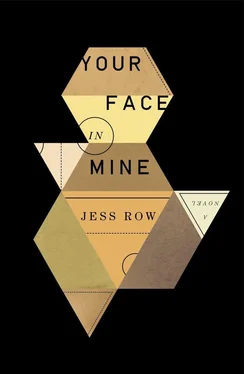It took longer and longer, every day, to step out of the sticky webwork of the dream and orient myself. I could make it all the way to the bathroom without knowing where I was. Or who I was. Every muscle in my body felt smooth and slack; my skin was the non-color of skim milk.
What happened next is a little hard to explain. I can attribute it to the sickness, of course, to the loneliness of the graduate student in those years when the classwork is over and the degree is still inconceivably distant. I could blame it on Derrida and Barthes, de Man and Bataille, Gadamer, Benjamin, Steiner, Blanchot: all those who convinced me of the impossibility of what I was doing, and the necessity of doing it anyway. Derangement, Bataille once said, is the only key to learning. I became convinced that I should use my disorientation to my advantage. With what little febrile energy I had, I scotch-taped pages of Chinese poetry to the mirror in the bathroom, so that I would read them when I stumbled to the toilet in the middle of the night. I kept a legal pad tucked next to my leg and tried to write, only in Chinese, whatever came into my mind when I opened my eyes.
There was nothing. I felt crushed into my chair, held down by cinder blocks. Fits of weeping in the shower. I gazed down at my laptop in pieces, four stories below.
It’s miao , I said to Wendy one night. Miao is doing this to me.
You’re doing this to you, she said.
It wasn’t that she avoided me. For five weeks she’d brought all my meals on a tray: bowl after bowl of two-chicken soup, her mother’s recipe, plates of plain spaghetti, roasted duck eggs for strength. Somehow she’d convinced my doctors to make house calls when I couldn’t roll over in bed. But when I’d roused myself enough to sit in the chair, and then descended into the recesses of doubt, she stayed away, except to ask if I was hungry. How could I blame her for that? Would it have helped for her to say, this isn’t the mono, you’re clinically depressed?
Maybe it would have helped. It might have bought me some stability, some perspective, a middle way. But I doubt it. In any case, the cure was already upon us. I’m pregnant, she said, finally. It’s ten weeks now. And the next morning I was in the shower and back at the library by nine.
• • •
The poets Wu Kaiqin and Meng Faru were born three years apart, in 1095 and 1098, in Kaifeng, the capital of the Northern Song dynasty. Technically they were first cousins. Meng’s real father, Wu Qingfeng, the eldest of four brothers, was an alcoholic and chronic gambler who nearly bankrupted the family before dying of tuberculosis in his thirties; he fathered Meng with his uncle’s youngest concubine just before he died, and to spare the family embarrassment Meng was given to a servant and raised in the compound as her child. Despite this, Kaiqin and Faru were each other’s closest friends and playmates; they looked so much alike that strangers often assumed they were brothers. The Family Record of the Wu Clan , written by one of Meng’s great-grandchildren, states that they began composing poems together as soon as they had learned to write a few characters, scratching them on the flagstones of the family’s Orchid-Viewing Pavilion with pebbles taken from the goldfish pond. Later, when they were teenagers, they composed so many poems that the pages lay strewn across the garden like autumn leaves, stained with wine and candle wax . Wu was a brilliant military student who impressed the head of the Imperial Guard with a commentary on The Art of War when he was only seventeen; he passed the government’s highest exam, the jinshi , at twenty-one, and Meng, a more capricious but equally brilliant scholar, followed him only two years later. They seemed destined to be forever linked, poet-scholars at the highest levels of the Imperial administration.
Only five years later, when Wu had just married his first wife, disaster struck. A confidential memorandum he had written criticizing the power of the eunuch Jin Kang over the Treasury was discovered lying on the ground outside the palace gates, apparently dropped by a clumsy courier. Circulated throughout the capital, it made him an instant enemy of Jin and his many powerful allies. Six months later, Wu was banished to a remote outpost, Zhongdian, on the western frontier of Yunnan Province, nearly four thousand miles from Kaifeng. He never returned to the capital.
I first read the Family Record of the Wu Clan in Wudeng, in an anthology of minor Song historical documents in the Weiming College library. The Record contains nearly a hundred poems by Meng — appropriately, as it was written by Meng’s descendant — but only a handful of Wu Kaiqin’s. Most of them, the Record states, were lost in the second Jurchen invasion, after Wu’s death, when the town of Zhongdian was burned and then razed to the ground. In the first Jurchen invasion Wu had been taken captive, with his family, and held hostage in the Taklamakan Desert for fifteen years, while the Jurchen negotiated a sweeping land treaty with the Emperor. Because diplomatic correspondence passed back and forth regularly, Wu was able to send and receive letters, and the only poems of his that survive were enclosed in letters he sent to Meng Faru. The letters themselves were thought lost until the 1960s, when they were rediscovered in a miscellaneous appendix to a forgotten anthology in the National Library in Taipei. My dissertation, a translation with commentary, was titled The Captivity Letters of Wu Kaiqin .
• • •
B y the early decades of the twelfth century, when Wu Kaiqin wrote his letters, I wrote in my introduction, China had been the conscious center of its own universe for nearly two thousand years. Educated people knew, in theory, that beyond the Tibetan plateau and on the far side of the tribute kingdoms of Central Asia and Vietnam there existed other civilizations, most notably India, where the Buddha was born. A few government officials, geographers and mapmakers, who had contact with merchants from the Middle East, knew that the caliph of Baghdad ruled over a vast kingdom that included red- and blond-haired men with large noses and white skin. But outside of Kaifeng and the other large cities, then as today, most Chinese people had never seen anyone of another ethnicity. Even citizens of the major tribute states, Korea, Vietnam, and Japan, resembled Chinese people very closely. To be human was to look Chinese.
Wu Kaiqin and his family had the almost-unheard-of experience, among Chinese people of their era, of living surrounded entirely by foreigners for fifteen years. At the time of their capture the family numbered eleven — Wu, his three wives, and their seven children, ranging from infancy to thirteen years old. The youngest child (name unknown) died of a diarrheal illness in Turfan soon after they arrived there. The other ten all survived the experience, but all of them, apart from Wu Kaiqin, his first wife, Tian Mei, and their eldest son, Wu Fengguang, chose to stay in Turfan rather than be returned to China when the period of captivity ended and Prince Jilan allowed them to go. In his letters to Meng Faru, Wu Kaiqin never explains the circumstances that ruptured his family, or even alludes to the two wives and six children he left behind in the desert. But the Family Record of the Wu Clan cites other sources that claim that Wu’s younger wives deserted him for Jurchen husbands, and that his two younger sons both married Jurchen wives. It also says that when given free passage by the Prince, Wu “allowed everyone in his family to choose freely whether to stay in Turfan or return to the land of the black-haired people, the land of the One Hundred Names.”
Читать дальше












